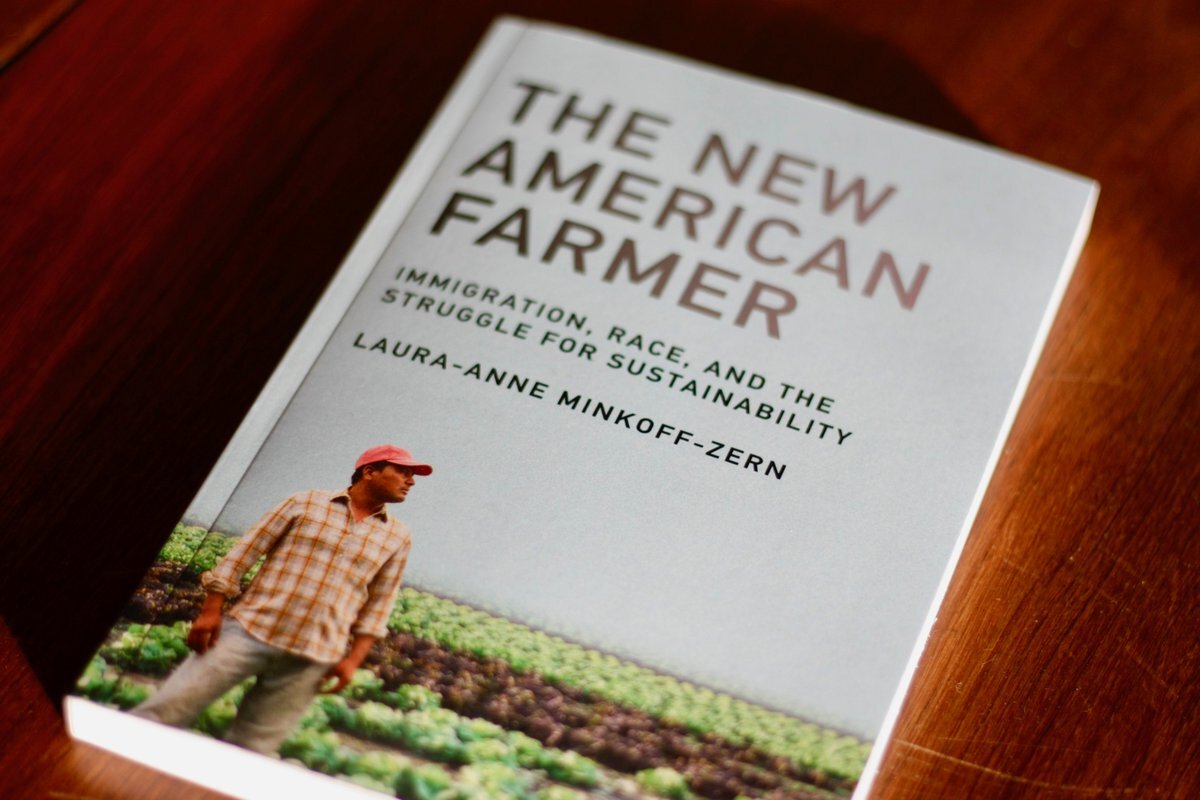RECENT BOOK TALK: THE NEW AMERICAN FARMER BY LAURA-ANNE MINKOFF-ZERN
By Yusra Bitar, Food Studies Program Assistant and Kristin Reynolds, Lecturer, Food Studies and Environmental Studies; Tishman Environment and Design Center Affiliated Faculty
On October 26th, 2020, Dr. Laura-Anne Minkoff-Zern, Associate Professor and Program Director of Food Studies at Syracuse University, spoke about her recent book “The New American Farmer: Immigration, Race, and the Struggle for Sustainability'' (MIT Press, 2019) in on an online talk hosted by the Food Studies Program at The New School. The event was organized in connection with faculty member Kristin Reynolds’ Food and the Environment course, and there were more than 120 participants from across the United States in attendance. In this short piece, we include a brief summary of the book’s key arguments and reflect on its relevance for the study of food and sustainability.
Key arguments in this book:
In its description of the book, MIT Press notes that in The New American Farmer, Minkoff-Zern explores the experiences of Latino/a immigrant farmers as they transition from farmworkers to farm owners, offering a new perspective on racial inequity and sustainable farming. She finds that many of these new farmers rely on farming practices from their home countries—including growing multiple crops simultaneously, using integrated pest management, maintaining small-scale production, and employing family labor—most of which are considered alternative farming techniques in the United States.
Drawing on extensive interviews with farmers and organizers, Minkoff-Zern describes the social, economic, and political barriers immigrant farmers must overcome, from navigating USDA bureaucracy to racialized exclusion from opportunities. She discusses, among other topics, the history of discrimination against farm laborers in the United States; the invisibility of Latino/a farmers to government and universities; new farmers' sense of agrarian and racial identity; and the future of the agrarian class system. Minkoff-Zern argues that immigrant farmers, with their knowledge and experience of alternative farming practices, are—despite a range of challenges—actively and substantially contributing to the movement for an ecological and sustainable food system.
What does this book mean for food studies and sustainability?
As Minkoff-Zern discussed in her talk on October 26th, the possibility of agriculture as a livelihood strategy in the United States is affected by the political, social, economic, and environmental realities that surround it. International trade and immigration policies, along with climate change and other global phenomena, make owning or operating a farm in the United States increasingly challenging for many independent or small/family farmers. Yet, according to USDA Census data that Minkoff-Zern references, the number of Latino/a farm operators increased by 21% between the years 2007 and 2012, despite the challenges that include bureaucratic limitations, language barriers, market access, and overt racial discrimination by other farmers. More broadly, Minkoff-Zern points out that small scale farmers do not have access to the same opportunities that large scale ones do, in terms of access to financial resources for agricultural production, for example. This desire among former farmworkers in the United States to start their own farm business in the face of these barriers relates to interests in the interdisciplinary field of food studies including resistance to cultural oppression and preserving foodways, placemaking, and farmers’ control over their own labor and farming practices. Their work is more than just a business; it is a livelihood and a matter of love for farming. As one interviewee Minkoff-Zern quotes in the book explained, he does it “for the freedom.”
The themes above of direct relevance to the study of food and environmental sustainability. Food studies scholar Dr. Marion Nestle has observed that food studies has continually evolved alongside the food movement, and has asked food studies to contribute to “changing the world.”[1] Dr. Psyche Williams-Forson, another key food studies scholar, insists on bringing an intersectional approach to food studies. She argues that intersectionality theory’s commitment to social justice and to “dismantling” unjust power structures would strengthen food studies by enabling it to better understand dynamics of the food system.[2] Critical food geographer Dr. Julie Guthman observes that food justice researchers often seek to support food movements through their work. She pushes such scholars to do so with a commitment to the integrity of engaged scholarship and scientific inquiry.[3]
In The New American Farmer, Minkoff-Zern shows that immigrant farmers, with their knowledge and experience of alternative farming practices, are — despite a range of challenges — actively and substantially contributing to the movement for an ecological and sustainable food system. Her book has contributed meaningfully to scholarly discussions and public debate on the future of food and agriculture, and on policy changes needed to reshape the food system toward more just and sustainable outcomes. We are grateful to have had the opportunity to host Dr. Minkoff-Zern for an online talk at The New School and to help broaden awareness of these realities through the lens of food studies.
The event was sponsored by the Food Studies Program, the Tishman Environment and Design Center (TEDC), and the Environmental Studies Program. The New American Farmer is available on the MIT press website and is open access. More about Dr. Minkoff-Zern’s work found here.
You can access the event recording here, on the TEDC YouTube channel.
[1] Nestle, M. 2010. Writing the Food Studies Movement. Food, Culture and Society: An International Journal of Multidisciplinary Research. 13 (2): 162-170.
[2] Williams-Forson, P. and Wilkerson, A. 2011 Intersectionality and Food Studies. Food, Culture and Society: An International Journal of Multidisciplinary Research. 14(1): 7-28.
[3] Guthman, J. 2008. “Bringing Good Food to Others: Investigating the Subjects of Alternative Food Practice.” Cultural Geographies. 15, no. 4: 431–47.


